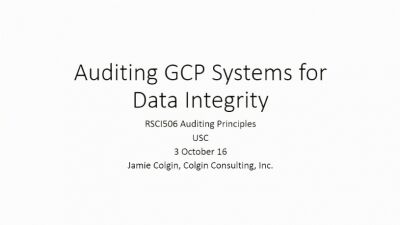- Data Integrity concepts
- ALCOA + CCEA
- Paper replaced with electronic files
- GMP inspections have revealed data integrity problems all over the world
- GCP systems
- EDC-Electronic Data Capture
- IWRS-Interactive Web Response
- Instrument Systems
- LIMS-Laboratory Information Management
- PIMS- Patient Information Management
- PV- Pharmacovigilance
- ECG reading systems
- Radiological image reading systems
- Programs to analyze and report subject data
- LMS-Learning Management
- EDMS- Electronic Document Management
- ETMF- Electronic Trial Master File
- CTMS- Clinical Trial Management
- Regulatory framework for enforcement
- Investigator, Sponsor and CRO are 3 responsible entities in a clinical trial
- Intended Recordkeeping ICH E-6: Investigators are responsible for all data in CRFs. Any discrepancies are the responsibility of the investigators.
- IVRS Provider, EDC Provider, ePRO Provider, CRO, Central Lab are all selected by the Sponsor. Sponsor delegates all the responsibilities.
- Investigator prepares case histories and sends data to the contractors/sponsors.
- Auditing for data integrity
- Quality Management System (QMS) auditing helps us verify that a provider has processes, procedures, equipment, facilities, supporting documentation and qualified personnel to provide high quality services.
- Data integrity audits show how a sponsor is preventing and detecting data integrity problems and risks.
- Preparing for a data integrity audit
- Review:
- Protocol
- Quality agreement
- Documented requirements
- Instructions provided and data transfer specifications
- Ask clinical team about problems they experienced
- Study manager
- Data manager
- Statistician
- Programmer
- Technical monitors
- Identify parameters that have a serious impact on subject safety:
- Exclusionary parameters
- Change in parameters
- Efficacy parameters
- Identify equipment used to create those parameters
- Research the equipment
- Draft a data flow diagram
- Review:
- Conducting a data integrity audit
- Don’ts:
- Read all QMS documents
- Focus only on computer system validation
- Review descriptions
- Read all disaster recovery plans
- Do’s:
- Work to develop high quality data
- Focus on implementation parameters
- Look at audit trails
- Pay careful attention to how flat files are managed
- Concentrate on QMS documents that support your work
- Don’ts:
Regulatory Science Symposium: Monitoring and Auditing Session 3: Auditing GCP Systems for Data Integrity (2016)
In this series, we will discuss data integrity, GCP systems, regulatory framework enforcement, and auditing for data integrity
Regulatory Science
Responsible Conduct of Research
Course Syllabus/Topics
Acknowledgement
Accompanying text created by Amelia Spinrad | Regulatory Knowledge Support Specialist | spinrad@usc.edu

